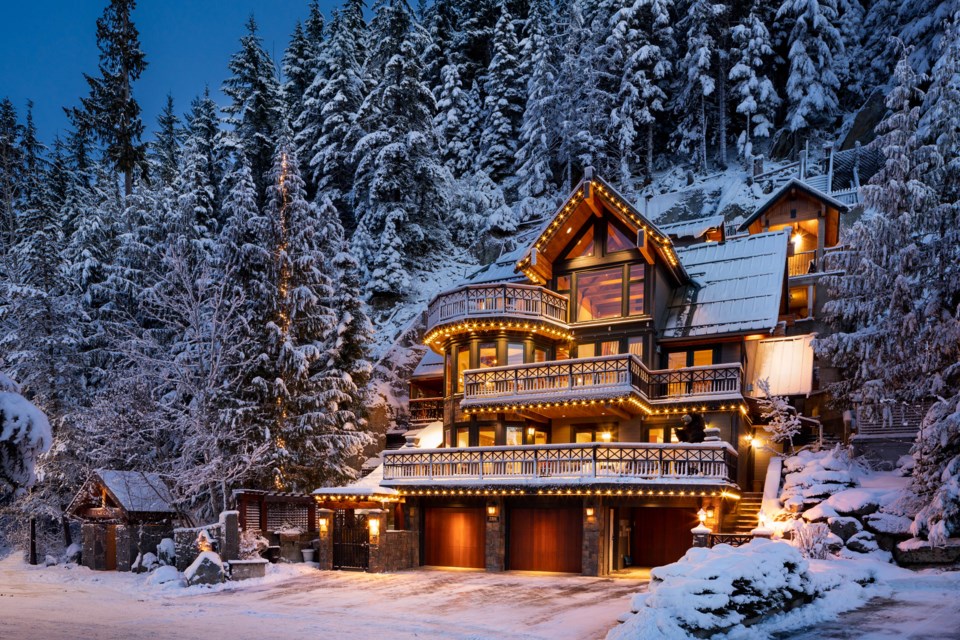Property values in Whistler rose one per cent last year, according to BC Assessment, but sales figures from local realtors tell a different story.
While sales predictably dropped off in March when COVID-19 hit (with just 11 transactions that month—the lowest since December 2018, which saw 19 sales), the slowdown led to a pent-up demand that exploded in September and October.
According to figures provided by Ann Chiasson of Re/Max Sea to Sky, total transactions in Whistler hit 129 in October—the busiest month of the past five years.
You’d have to go back to February 2016, which saw 120 sales, to find a comparable month, transaction-wise.
Dollar-for-dollar, Whistler’s real-estate market looks like it was hotter than ever in September 2020, with $194 million in sales volume posted that month—blowing away a previous highwater mark of $122 million set in May 2017.
Much of the demand is for single-family homes and townhouses, and coming from Vancouver, Chiasson said, though there is interest from other parts of Canada as well.
“Honestly, when the Americans are allowed to come back, we could have a whole influx of other people,” she added.
Average sale price also continued to rise in 2020, going from $1,033,000 in the second quarter of 2019 to $1,564,000 in Q2 2020 (before falling slightly to $1,515,000 in Q3).
“Everything’s kind of up, but the reason is [due to] COVID, the market stopped for four months, basically, and so there is a certain amount of pent-up demand,” Chiasson said.
“But there are also people that are looking at alternatives for lifestyle, and if they get stuck in something like this [pandemic], they want a place to go … some people are relocating here, so we’re seeing a lot of families looking at us as a better place to live, because they can work from home now.”
Factor in low interest rates, and Whistler makes for an extremely attractive pandemic investment for some buyers.
“Higher-end sales are up, so we have more people with money making a lifestyle choice, looking at making Whistler their little getaway place,” Chiasson said.
“I don’t know if it’s an arrival, or if it’s going to carry on, [but] all indications are that the market is going to carry on through 2021.”
As BC Assessment uses July 1 as its cutoff date for sales data, it’s not likely that the one-per-cent average tells the whole story, said Pat Kelly, of the Whistler Real Estate Company.
“I don’t think it’s indicative of the marketplace, no. The marketplace was probably stronger,” Kelly said, though he noted that, as in every year, the assessed value of every property would be different.
“I just looked at a property that is coming on the market next week, and the assessed value this year is eight per cent down from last year,” he said.
“I think it behooves everybody to take a look at their assessments this month, and just see where they stand, because I think that you’re going to find that the one per cent isn’t consistent across the entire marketplace.”
According to BC Assessment, as of July 1, 2020, the average assessed value of a single-family home in Whistler was $2,034,000 (up from $2,014,000 in 2019).
Condo and townhouse properties were also up one per cent on average, from $920,000 to $931,000.
On the commercial side of things, most Whistler properties actually saw decreases in value between zero and five per cent, said Bryan Murao, deputy assessor with BC Assessment.
Just 12 per cent of commercial businesses saw an increase in assessed value, Murao said—a stark contrast from just two years ago, when commercial properties increased in value by 23.36 per cent, on average.
The drop in assessed value for commercial properties is not uncommon this year, Murao said, aside from perhaps industrial markets found in the Lower Mainland.
“Whistler, of course, is a little bit more dependent on the hotel industry, as well as the retail industry, and those industries were impacted a little bit more by COVID than say industrial,” he said.
“I think that’s why you’re seeing that most commercial properties are receiving decreases in Whistler, even if it’s not really huge decreases.”
The total assessed role for all property classes in Whistler is now $19,678,508,100, up 1.37 per cent from last year.
In Pemberton, the average single-family home was assessed at $945,000 on July 1, 2020 (up from $873,000 the year before, an increase of eight per cent), while Squamish saw a 10-per-cent jump (from ($930,000 to $1,026,000).
“Now it’s almost like Squamish is just another suburb of Vancouver,” Murao said.
“What we see when it comes to market movement in Squamish is that it’s more aligned with what’s happening on the North Shore of Vancouver than it is perhaps with the rest of the Sea to Sky market.”
Overall total assessments in the Lower Mainland region—which includes all of Greater Vancouver, the Fraser Valley, the Sea to Sky area and the Sunshine Coast—rose to about $1.46 trillion, with more than $15 billion being added by new construction, subdivisions and rezonings, according to BC Assessment.
Property owners have until Feb. 1 to dispute their assessment. Head to www.bcassessment.ca for more.




